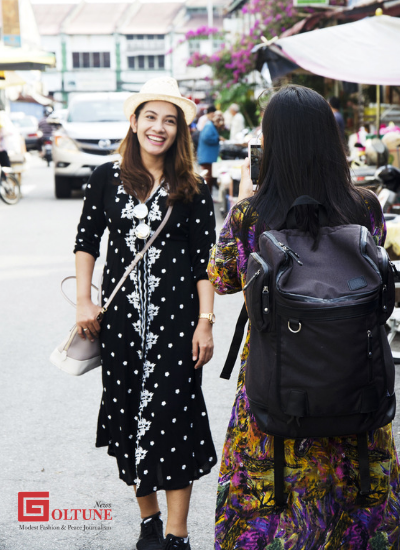
-
Muslims are predicted to spend $220 billions in 2020 on halal holidays (Muslim-friendly destinations)
-
Halal holiday demographics are well-educated, upwardly mobile and young travelers. Global average age of Muslim-majority countries is 22.
-
Muslim female solo travelers are on the rise.
-
There is no uniformity in the system dedicated to halal certification process.
-
Halal travel lacks financial investment from external parties. Also, the industry suffers from on-going gender issues.
Reposted from Hospitality Net
and The National
A woman reclines on a bed of colorful cushions. The picture-perfect ocean in front of her is framed by a private cabana and the twinkling horizon is bathed in orange hues. The Instagram caption reads: “Just taking in all the views. Cannot wait to be back in the Maldives in two weeks.”
Sukaina Rajabali saw a disparity in Instagram posts about Muslim women solo travelers. To fill the gap, Rajabali launched @shetravelsmodestly, a repost Instagram account. “I came across so many beautiful repost accounts, but none would show gorgeous, modestly dressed women. It was all about showing skin while being on a beach – and I wanted to show people that you can still travel, but you can do so modestly,” the influencer, who lives in Dubai, said to The National.
 The rise of female solo travel is another noticeable change in the halal travel demographic, and Rajabali is particularly keen to connect with these women, who are not necessarily seeking the same things as traditional Muslim travelers. “Women are becoming more educated, marrying later in life, getting better jobs and have more disposable income, and I want to encourage them to travel.”
The rise of female solo travel is another noticeable change in the halal travel demographic, and Rajabali is particularly keen to connect with these women, who are not necessarily seeking the same things as traditional Muslim travelers. “Women are becoming more educated, marrying later in life, getting better jobs and have more disposable income, and I want to encourage them to travel.”
As halal travel begins to move away from being seen purely as a religious-driven sector, Rajabali has seen shifts in the market. “I’m noticing little changes that help make Muslim travellers feel comfortable and catered to. I recently arrived at a hotel on a tropical island and, even there, I had a prayer mat in my hotel room,” she said.
Studies on Halal Tourism by Holden Madison.
Halal Tourism Growth Drivers
If religious reasons, such as the annual Hajj pilgrimage to Mecca, have historically been driving a large portion of Islamic travel, it has been evolving rapidly over the past few years. Digitally-savvy young Muslims are now playing a critical role in putting new destinations and leisure hotspots on the map and influencing older generations in the way they plan their trips.
Some of the top in-bound destinations for Muslim travelers for Organization of the Islamic Conference (OIC) countries include Saudi Arabia, Turkey, and the United Arab Emirates. Top Muslim in-bound destinations of Non-OIC countries include Spain, France, and Russia. These Non-OIC markets offer the perfect launch pads for targeted Halal tourism.
Responsible tourism

Protecting the environment and ensuring quality living standards are signature elements of the Islamic faith. Hence, it is no surprise that environmental justice and social causes as reflected in the United Nations Sustainable Development Goals (SDG) are expected to continue to spill over into 2019 Muslim travel habits.
Artificial Intelligence and Augmented Reality
In another area of growth, Artificial Intelligence (AI) will enable Muslim travelers to maximize their journeys by developing personalized itineraries and interactions through chatbots and Intelligent Personal Assistants (IPAs).
Augmented Reality (AR) will also come into focus by layering digital information and certification on top of physical spaces. To illustrate this, a Muslim traveler will be able to wave his or her phone in street view and retrieve instant information of buildings related to Halal-friendly restaurants.
AR can also extend its presence as a virtual compass and companion for Muslim travelers by, for example, beaming information related to lost Islamic heritage landmarks. Specialized itineraries using AR could help bridge the past and present for Muslim travelers in destinations like Alhambra, Spain.
Stronger Muslim Lifestyle and T

ravel Brands
Advisor to New York-based Wall Street Blockchain Alliance Rushdi Siddiqui comments:
The Muslim Travel Market (MTM) is a fragmented marketplace of content and destination-based sites, bloggers/vloggers, Travel agents, Muslim country and non-Muslim country offerings, etc. In such a fragmented marketplace, information search costs are high, offerings/brands are localized, and the seamless search experience and reservations are work in progress.
This is bound to change moving forward when the current crops of Halal-friendly start-ups will be injected with venture capital funding, leading not only to increased consolidation and cohesion, but also enhanced optimization to become stronger brands.
DIY Pilgrimage Travelers
The Muslim pilgrimage travel business will also continue to face disruption from do-it-yourself travelers. Umrah, the lesser pilgrimage made by Muslims to Mecca at any time of the year, and the Hajj, the greater pilgrimage made by Muslims to Mecca at the last month of the year and one of the 5 Pillars of Islam, have travel agencies scrambling to cater to Muslim needs.
These agencies are increasingly threatened by do-it-yourself travelers: The Umrah visa process, for example, will be streamlined through internet applications, providing access to virtually all Muslims, cutting out the need for specialized tour operators who formerly often obtained these visas.
Through Virtual Reality (VR) or phone and web apps, Muslim travelers will also be able to familiarize themselves with Umrah rites and rituals, no longer needing to rely on hired guides and tour groups.
Rising Non-OIC Destinations
Non-OIC markets such as South Africa, Japan, and Taiwan are also increasingly offering Halal-friendly tourist options. These countries are investing in national campaigns and resources that attract young Muslim travelers who are spontaneous and adventurous. These “Instant Noodle Trips” can be booked at short notice to find rejuvenation and lifestyle inspiration; they are defined by affordability, availability, and convenience.
Adapting Hotel Offerings and Operations
Hotels are finally waking up to Muslim travelers’ needs; in order to stay competitive, they must offer Halal-specific measures. Specifically, a key aspect in Halal tourism is the bridging of differences and the respecting of the common values in the Muslim faith; this includes offering Halal food, access to Ramadan services, privacy, and water-friendly restrooms.
 How to Introduce Halal Tourism
How to Introduce Halal Tourism
Launching Halal Tourism in a new place boils down to four elements: access, communication, the environment, and services. Taking a closer look, access includes easy-to-follow visa requirements. Communication includes outreach and digital communication. Environment pertains to physical safety and faith restrictions. Services include the core needs of Halal food and prayer facilities.
It may appear easy in practice, but a closer look reveals the challenges tied to implementing compliance. Some of these factors include, for example, the lack of a uniformity in the system dedicated to the Halal certification process, the lack of financial investment from external parties, on-going gender issues, and the misunderstandings of Halal practices by non-Muslim guests.
Social, technological, and environmental impacts will remain driving forces of Halal trends moving forward. By offering user-friendly resources and tailor-made goods and services, hospitality institutions can capture a part of the expected 300 billion USD in Muslim travel expenditure and 180 billion USD spent on Muslim online travel purchases (just in 2020 alone).
Despite the impressive forecasts and rapid evolution of the market, many institutions are still largely overlooking this travel sector. Understanding and addressing the specific needs of Muslim travelers, adapting products and services, as well as tapping into the opportunities created by new technologies, becomes crucial to fully cater to the evolving needs of Muslim travelers.







 How to Introduce Halal Tourism
How to Introduce Halal Tourism